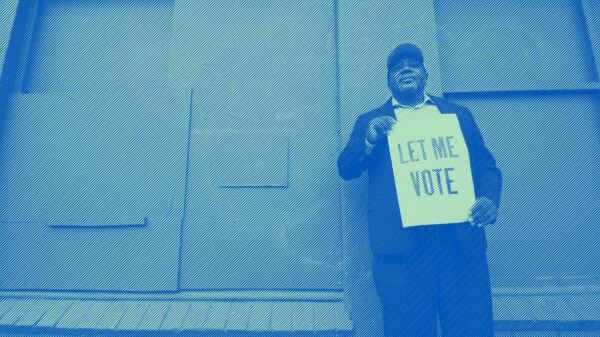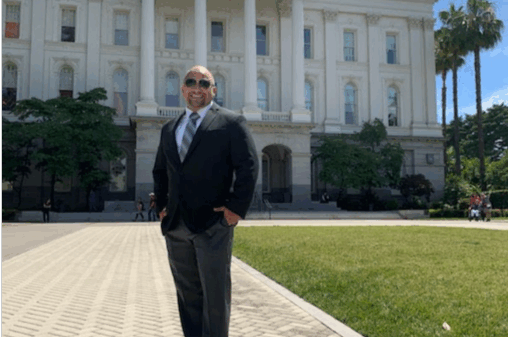SACRAMENTO, CA — Today the California State Senate passed Assembly Constitutional Amendment (ACA) 6, which would restore voting rights to over 50,000 Californians after release from prison. ACA 6, authored by Assemblymember Kevin McCarty (D-Sacramento), passed with a 28-9 vote in the Senate, receiving the two-thirds required for a constitutional amendment. The bill also passed the Assembly with a two-thirds majority in September of 2019. It will now go before voters on the November 2020 ballot.
The vote comes at a time when communities across the country are rallying around a call to end racial injustice in policing. Now, more than ever, it is clear that there is work to be done to strengthen our democracy by making it fair and inclusive for all. As we work to reimagine law enforcement and end mass incarceration, it is critical to also end voter suppression tactics that keep people impacted by our legal system out of the voting booth.
“The removal of the right to vote is not based in an interest in public safety,” said Taina Vargas-Edmond, Founder & Executive Director of Initiate Justice. “Rather, it is rooted in a punitive justice belief system that intentionally attempts to rob marginalized people of their political power.”
Currently in California, otherwise-eligible adults can vote while they are on most forms of community supervision — including probation, county Post-Release Community Supervision, and federal supervised release — but cannot vote while they are on parole. This measure would amend California’s constitution to ensure that any otherwise eligible person who is not currently in prison can vote.
“ACA 6 gives Californians the chance to right a wrong and restore voting rights for a marginalized community and people of color. This is good for democracy and public safety,” said Assemblymember Kevin McCarty (D-Sacramento).
ACA 6, also known as the Free the Vote Act, is a priority bill of the California Legislative Black Caucus and would help to reverse the history of racial oppression behind California's felony disenfranchisement laws, which are rooted in a history of Jim Crow segregation. Due to inequities in the criminal legal system, these policies disproportionately silence the voices of Black and brown people. Three of every four men leaving California prisons are either African American, Latino, or Asian American — and Black Americans are four times more likely to experience felony disenfranchisement than white Americans. This constitutional amendment will roll back a form of voter suppression currently facing Californians of color and will signal to all Californians that their voices matter.
“People of color have been systemically locked out of the ballot box in California for years,” said Brittany Stonesifer, voting rights attorney with the ACLU of California. “Our state’s discriminatory policing, incarceration, and felony disenfranchisement have left far too many Californians voiceless on Election Day. We applaud lawmakers advancing racial justice and strengthening our democracy with ACA 6. Voters in November will finally have the opportunity to end this ballot box discrimination.”
Roughly 4.6 million people nationwide are not able to vote because of a felony conviction. Currently, over 50,000 people on parole in California — people working, paying taxes, raising families in their communities — are unable to vote in any local, state, or federal elections. California lags behind 19 other states and Washington, D.C, all of which either automatically restore voting rights upon release from prison or have no felony disenfranchisement whatsoever. In the past two years, Colorado, Kentucky, Nevada, New Jersey, New York, Louisiana, and Florida have collectively restored voting rights to approximately 2 million formerly incarcerated people. Iowa's Republican Governor has also signaled she will sign an executive order restoring voting rights before November 2020.
“Restoring the right to vote for formerly incarcerated individuals is good for voting rights, public safety and the community,” said Secretary of State Alex Padilla. “Shutting formerly incarcerated individuals out of the electoral process sends them the wrong message as they work to reintegrate into the community and lead a more productive life. I look forward to urging Californians to support this important measure on the ballot in November.”
Restoring the right to vote to people on parole is part of a long struggle in our nation’s history to make the franchise fairer and more inclusive.
"Today is another step toward the restoration of voting rights for more than 50,000 Californians, an important victory for our democracy,” said Dora Rose, Deputy Director of the League of Women Voters of California. "Putting the Free the Vote Act on November’s ballot moves us closer to fulfilling a promise the League made 100 years ago when the 19th Amendment was passed and women won the right to vote. No one is free until we’re all free.”
ACA 6 is co-authored by Asms. Rob Bonta (D-Oakland), Sydney Kamlager-Dove (D-Los Angeles), Rob Stone (D-Monterey Bay), Ash Kalra (D-San Jose), Wendy Carrillo (D-Los Angeles), Mike Gipson (D-Carson), Lorena Gonzalez (D-San Diego), Kevin Mullin (D-South San Francisco), Shirley Weber (D-San Diego), and Senator Scott Wiener (D-San Francisco).
About the Free the Vote Coalition
The Free the Vote Coalition is made up of nine co-sponsors committed to passing the Free the Vote Act and restoring voting rights to people after prison. They include: ACLU of California, Californians United for a Responsible Budget, California Secretary of State Alex Padilla, Initiate Justice, League of Women Voters of California, Mi Familia Vota, People Over Profits San Diego, Vote Allies, and White People for Black Lives.
###
Related Content

Free the Vote for Californians on Parole (ACA 6)

Our Democracy Needs Everyone, Including People on Parole
Stay Informed
Sign up to be the first to hear about how to take action.
By completing this form, I agree to receive occasional emails per the terms of the ACLU’s privacy statement.
By completing this form, I agree to receive occasional emails per the terms of the ACLU’s privacy statement.
